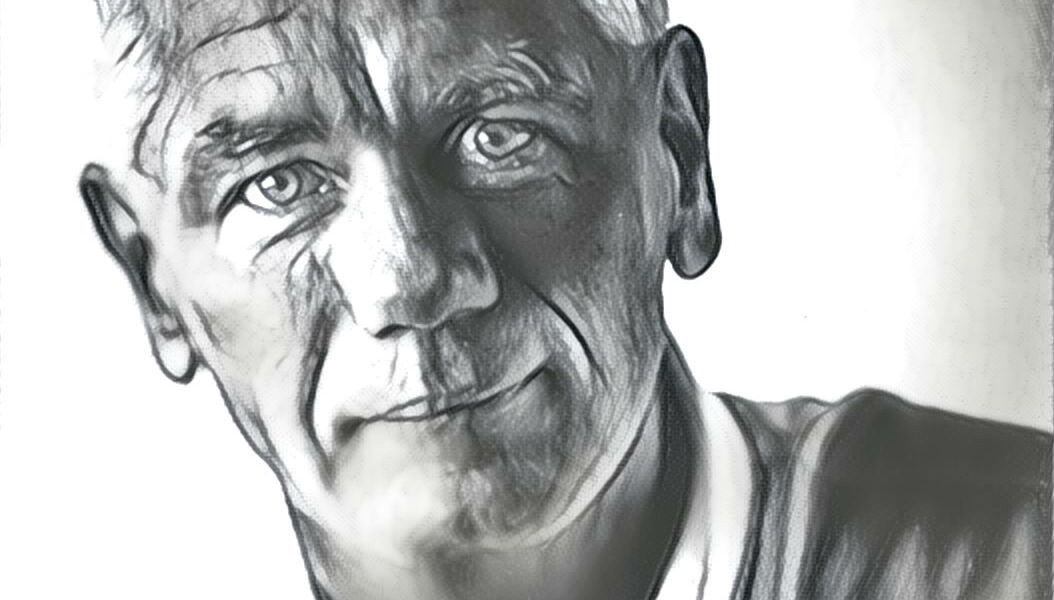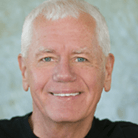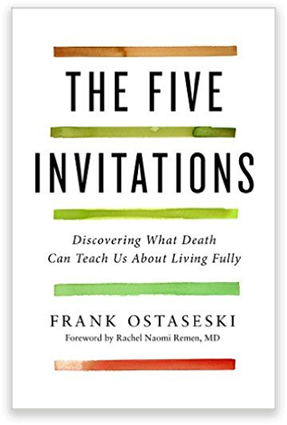Thirty years ago, at the height of the American AIDS epidemic, Frank Ostaseski cofounded America’s first Buddhist hospice–the Zen Hospice Project in San Francisco. Since then he’s taught compassionate, contemplative caregiving across the world, and personally accompanied over a thousand people to their end. He is also author of The Five Invitations: Discovering What Death Can Teach Us About Living Fully, a beautiful new book about the many ways intimacy with death brings meaning to life.
As part of our ongoing Redefining Masculinity package, Thrive Global spoke with Frank about how gender frames dying, the particular pressures men face at end of life, and what a surprisingly active process leaving this mortal coil really is.
This interview has been condensed and edited.
THRIVE GLOBAL: Do men die differently?
FRANK OSTASESKI: It’s easy to fall into stereotypes. The reality of course is that everybody dies differently. Everybody gets born uniquely, everybody dies uniquely. Familial upbringing, cultural beliefs, religious beliefs, gender—all of those conditions converge around the time of dying.
Are there some patterns that happen differently with men than women? Men do die earlier than women, by an average of four or five years. And we know that what they die of is different than it is for women.
Heart disease is the number one killer of men and women. Women tend to die of diseases of older age, at least in wealthy nations: Alzheimer’s, stroke, et cetera. Men tend to die of the same illnesses that women do, but a higher percentage of death from suicide, and things like car crashes and boat injuries, homicide. Those are causes of what we might call premature or unintentional deaths.
T.G.: Do men meet their death differently?
F.O.: The way men we grieve is really different than the way women grieve. That’s a problem in that most of the systems we have in place to deal with grief tend to follow a more female model of talk therapy—we’re going to feel better after sharing it with others. That’s not necessarily how all men find a way through grief.
We can speculate on why that’s there. Men have been told to suck it up since they were kids. Even today they’re told to suck it up, to be stronger when facing crisis, particularly the crisis of dying. In public they might in fact maintain that expectation. In private that can be quite different.
In the dying process, all the ways we’ve defined ourselves—I’m a mother, I’m a father, I’m a teacher, I’m a writer, whatever it is—all of those are either gracefully given up or painfully stripped away by illness. They all go. But who we are outside of our roles—our individual identity—is renewed by the dying process.
T.G.: That makes me think of how hard retirement is for so many men—it’s sort of a professional death.
F.O.: Yes, but that’s changing also. In the old days, the expectation was that you’d retire at 65 and play golf, but that doesn’t suit most of the baby boomers coming up. Yet they’re still stuck with that model, and they don’t know what else to do. You see men extending their work life much longer, working long into their seventies. I think that’s in part because they might be attached to the role, the identity, and they also don’t necessarily know what to do with their experience when it’s not based around activity. Recreation can only occupy us so much.
Men often need to be more active in their grief. It takes shapes like gardening, writing or learning a new skill.
T.G.: Maybe it’s because I’d like to think of myself as young, but death doesn’t sound very active to me.
F.O.: Death is active in the sense that people are always having to deal with something new. There’s a new symptom, a new pain, a new condition they’re having to meet—in that way, it’s active. People will meet all of those changes differently. There’s constant change in the dying process. Of course, there’s change throughout your life, but in the dying process, that seems to accelerate.
There’s the active engagement of saying goodbye. When we die, the circles of relationships start to get smaller. The bigger circles of our work world, our community tend to shrink. It gets down to increasingly more intimate circles: family, close friends, or just alone. That process of saying goodbye, offering forgiveness or gratitude when that is necessary—those are all active engagements that people have as they’re moving through their dying process.
There’s also dying that happens through suicide. The rates of suicide in men are double what they are in women. There’s fear and lots of other issues involved in suicide, but one of things involved in suicide is control—I get to control an out of control experience.
T.G.: Are men more oppositional in dying? Is there something different about how men are acculturated to suffering?
F.O.: it’s not just that men are more oppositional. I’ve seen women leave skid marks dragging their heels into death. For men in the over 50 group, there is an expectation that one would endure pain, one would fight to win.
Look at what happened when John McCain got diagnosed with glioblastoma cancer. Almost nobody comes back from glioblastoma. Obama tweeted that “cancer’s never met a fighter like John McCain.” And Joe Biden wrote that John McCain “will beat this.” Nobody said, John McCain is a strong man, a graceful man who will find his way through this cancer.
T.G.: What’s revealed in that?
F.O.: There’s this relationship between illness and death, thinking of it as the enemy, that you’ve got to beat it, and that men will try harder to beat it. If they beat it they’re strong, and if they don’t beat it, they’re weak. When we say things like that to men, or to women for that matter, we set them up for guilt and failure.
Whether that’s a macho thing of, you’re going to beat it, Joe, or some New Age idea that says you’re responsible for your cancer because you ate too much gluten or didn’t hold the right ideas about your spiritual life—both are ways of keeping death at arm’s length, and seeing it as an enemy. Whether it’s machismo or New Age gobbledygook, we have a tendency to create an awful lot of guilt and a sense of failure when people are dying.
T.G.: What’s the alternative to “death as the enemy”?
F.O.: People always ask me, what’s important to people as they die? They want to know that now so they can act on it now. What the wisdom that death has to show us is how to live our lives now—how to live more fully, how to live a life of meaning and integrity, how to live in a responsible way now.
When we get how precarious life is, and we embrace that, as opposed to denying it, we understand how precious it is. Then we don’t want to waste a minute. We want to tell the people we love that we love them. We want to act and function in a responsible way. The impermanence of life gives value to life, and helps us to appreciate it and see its beauty.
T.G.: What do men want as they die?
F.O.: Legacy is a really big issue for men in their dying process. What will they leave for their children? I was working with a man not long ago who had severe ALS, and he was really coming close to the end of his life, and he said there’s nothing really for me to do. And I said, there’s one more thing. And he said, what’s that. And I said, teach your children how to die.
You could see on his face that he was confused for a bit, then he really lit up. He said, I’ve taught my children everything, how to ride a bike, how to drive their cars, how to get married. But I haven’t taught them how to die. And it really changed the whole dying process. He went into his dying very cognizant, not because he wanted to look good, but because he really wanted to give that legacy to his children.
It’s not just a matter of passing on one’s worldly goods, but also passing on the gifts of one’s life. That’s not just a male thing, but it’s very prevalent in men. With men, the moment of dying has almost always been what I call a ‘gift-giving moment’—sometimes a physical object, but often it’s a piece of wisdom, something they’ve learned, a question they want to pass on. And somebody needs to be there to receive that question or wisdom.
T.G.: The gift is a representation of legacy?
F.O.: And value. Go back to John McCain: there’s a whole question here about men’s value being derived by how they’re perceived by others. Did I make a success of my life? those kinds of questions.
When people come to the end of their lives, men and women, there seem to be two really important questions that shape the process. One of them is, Am I loved? Does somebody love me, do they still love me now? And the second question is, Did I love well? And it’s not just evaluative or analytical or critical, it’s I want to know, did I do a good job? It’s way more important than, did I build my company up and make a big success of it? Those questions are there both for men and women. For men, the legacy issue is, what have I given forward?
These are stereotypes, but women tend to be more relational than men. In my own marriage, I tend to be the more relational one, but in general, women still carry that caregiver role. The challenge with women is to receive care. I find that men are much more open to receiving care than women. They may comment on it, say don’t fuss with me too much, and they have a way in which they’d like to receive that care, but they’re not unaccustomed to receiving care from women over the course of their lives, whether it’s their mothers or their spouses.
T.G.: What you said earlier about having roles stripped away—that’s frightening! Especially since so much of establishing yourself in life is about acquiring, or earning the right, to have these roles.
F.O.: There’s something beautiful about having roles, and there’s nothing wrong with that. It’s just that we need to hold them lightly. Roles, like most things, are fluid, are constantly changing. When our parents get older, roles reverse, and the children themselves become the caregivers. If I’m the nurturer in my family and I get sick, somebody has to take care of me.
When we over-identify with roles, they define us, and confine us, and really reduce our capacity for conscious choice. We feel obliged to behave within the confines of that role. What happens is our whole self doesn’t really get to show up. And our more fundamental sense of self, of our humanity, doesn’t always get to show up. We get stuck in the role.
It’s really important to understand, at some juncture in our life, that we have roles, but they aren’t who we are. And if we don’t understand that in our development and our maturity, then when it comes to the time of our dying we feel like a rug is being pulled out from underneath us. And this happens to men—and women. Maybe moreso with men because there’s greater encouragement for men to stay more unidimensional in their roles.
That’s the challenge. Dying is stripping us of our roles, and that can be frightening, but it also opens us.
T.G.: What’s an example of that?
F.O.: I’m a hospice caregiver. I’ve made this my whole life’s work. But several years ago, I had a heart attack, and I had emergency triple bypass surgery. I was at home recovering for several months before I had to go back for another procedure because the first one failed.
While I was home, my whole sense of self got really shaken up: I’m the caregiver, the provider, the knowledgeable one. I had people all over the country looking to me, how’s he going to deal with his sickness? Can you imagine the pressure of that? For a while, it was really hard. It was pure hell. I was scared, I felt abandoned, I felt helpless.
As I paid attention to those things, I became more porous, I became more transparent, I became more fluid in my identity, so as a result I was way more relaxed. The world, its beauty and its horror, could impress itself on my consciousness. I used to think I had that already through my meditation practice, but I became much more intimate with it.
In the process, I saw how loved I was by others, and what that introduced me to was a love of my own being. The love of my own nature, if you will. That caused me to trust way more than ever before in my life. I trusted an intelligence bigger than my own life experience. And as I had that trust I began to rest. Not just physically, but mind at rest, heart at rest, consciousness at rest. And that enabled this feeling of increased transparency, and being able to release, or at least hold more fluidly, my roles, including my gender roles.
This is the scary thing, and the opportunity, that happens at the end of life. People’s fixed identities loosen, and potentially broaden, and come to include other things.




Leave a Comment